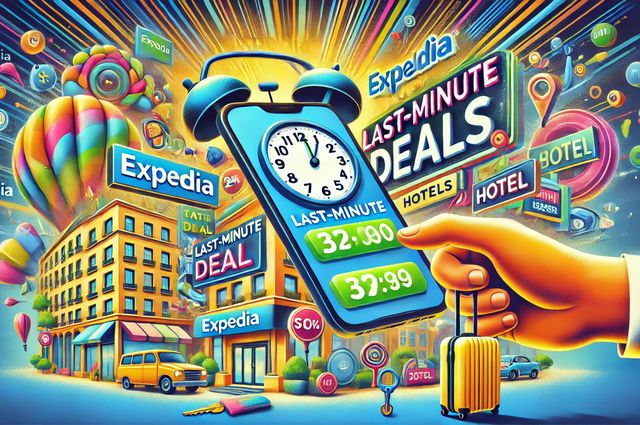Is Expedia’s Last-Minute Deals a Good Deal For Hotels?
11 experts shared their view
Expedia is actively promoting its Last-Minute Deals and brands them as hotelier's' opportunity "to target high-converting last-minute audience with same-day deals and last-minute campaigns."
Last-minute sales in travel are not a new phenomenon. There have been many attempts to find a way to dispose of these empty airline seats, idle rental cars, and empty hotel rooms at any cost.
Why last-minute discounting is bad for hotels?
Many industry experts claim that last-minute sales in hospitality at lower discounted rates are not sustainable as this approach jeopardizes all other distribution channels (hotel mobile site, hotel traditional website, GDS, phone reservations, even OTA distribution). Travel consumers are shopping around like crazy - Google claims that the average hotel booker goes through 48 digital touch points before making a hotel booking. How would they react when they find out that the $200 room they booked a week ago could now be booked for $125 on Expedia Last-Minute Deals?
The question is, is last-minute discounting good or bad for hotels?
No actions that drive business to OTAs away from direct channels are good for hotels. It's a simple concept. OTAs have been very creative in finding ways to train the consumer to choose their booking channels over hotels' own websites and this is just another attempt to do the same.
And it comes with all the same problems: lack of control over your own inventory, hefty commissions, no digital connection with your own guests, and on top of that - additional discounts for the last minute promotion. Which, in itself, not a good way to drive revenue because it doesn't actually come with profit growth, especially in the long run when consumers learn to wait till "the day of" to get a better deal.
Instead, hotels should adopt proper revenue management technology that allows them to forecast demand and strategically adjust their prices the way that won't result in too many unsold rooms so they won't have to resort to things like last-minute deals on Expedia that don't generate any profit but help OTAs become stronger.
Last-minute discounting is a double-edged sword for hoteliers. It can help fill unsold inventory, but it also carries significant risks that can undermine a hotel's broader revenue strategy and brand perception.
From a revenue perspective, unsold rooms are a perishable asset, and this type of policy can be useful to sell those rooms. However, the costs and long-term implications of participating in these programs often outweigh the short-term benefits.
The primary issue is rate parity and price integrity. Today's consumers are savvy and digitally resourceful, engaging with multiple touchpoints before booking. When guests discover that rooms are available at heavily discounted rates closer to check-in, it breeds distrust. This erodes direct booking efforts, pushes customers towards OTAs, and devalues loyalty programs. Moreover, frequent discounting can condition customers to delay bookings, expecting lower rates—a dangerous cycle for a hotel's yield strategy.
Additionally, heavy reliance on last-minute deals increases dependence on OTAs, which already take a significant commission, further reducing profitability. Hotels also risk alienating early bookers and loyal guests who feel penalized for committing early.
A better approach might involve targeted, value-added promotions instead of aggressive discounting. Offering flexible booking options, bundling services can attract last-minute bookers without slashing rates.
From my perspective, last-minute discounts are more of a Band-Aid than a real solution to suboptimal planning.
In my experience, especially in the high-end hospitality sector, heavy last-minute discounts can be damaging in the long run. I've seen situations where two guests book the same suite at wildly different prices, only to meet by the pool, strike up a conversation, and realize the disparity. On more than one occasion, hotels have had to issue refunds to avoid backlash and protect their reputation.
This issue might not be as glaring in mid-range or budget hotels, but the basic dynamics are the same. If a hotel is forced to offload rooms at the last minute—unless it's due to something extraordinary, like a group cancellation—it's usually because of what revenue managers call "spoilage." At that point, slashing prices might seem like the only option, but it often sets off a chain reaction. Competitors follow suit, rebooking spikes, cancellations increase, and the market becomes unstable.
In short, while last-minute discounts might seem like a quick fix, they usually hurt profitability and brand perception. More importantly, they highlight a bigger issue: flaws in the overall revenue management approach.
When I was a revenue manager, I avoided last-minute discounts like the plague. If guests expect better deals by waiting, they delay bookings and spend time shopping around. Early bookers feel cheated when they see lower rates later. Especially the ones that booked a prepaid rate. For the ones that booked a flexible rate, it stimulates cancellations and rebooking with an obvious impact on ADR. Instead, the focus should be on accurately predicting demand and gradually raising rates to achieve the optimal RevPAR. Discounting near arrival is not conducive to a strong long-term strategy that drives loyalty.
Not exactly. While offering last-minute deals may help drive immediate bookings, it can have long-term consequences that hinder a hotel's growth. Let me explain. Suppose I book a room on Expedia three months in advance to secure availability. Naturally, I'll check back periodically to ensure I'm still getting the best rate. When customers learn that better deals often pop up closer to the arrival date, it conditions them to delay bookings or to keep checking for lower rates, ultimately eroding your Average Daily Rate (ADR). Moreover, to maintain rate parity, you'll likely end up discounting across all channels. In the end, a single last-minute promotion could lead to widespread rate reductions, impacting overall revenue strategy.
There is a question of maintaining position in the market place. Although, if the practise of rate changes with increases and decreases on a fairly constant basis leading up to the day of arrival is normal, then I don't see why, where warranted, a property can't avail themselves of such an opportunity. Just make sure the same is applied to brand.com!
The customer has become somewhat educated and savvy to the practises of price management in travel. There are also plenty of price watching tools to monitor the rate change avalable to the end consumer as well.
One likes to think they got the best deal, but for the most part the individual traveller is not often discussing the rate they got on a specific date and time with another customer in the exact same situation. The industry is already taking this risk.
What might be interesting is the ongoing scrutiny of dynamic pricing and the potential for needing to refund the difference to the guest in reference to this topic. Best Available Rate etc.
Whether last-minute discounting is good or bad depends on the type of hotel. Luxury and lifestyle hotels focused on attracting high-value, premium experience-seekers should refrain from discounting because it erodes their brand perception: an association with lower perceived value attracts more price-sensitive (and less loyal) guests. Budget hotels should also be strategic: while filling otherwise empty rooms can bring in some last-minute revenue, frequent discounting trains OTA shoppers to wait for deals, reducing the hotel's ADR and RevPAR in the long run.
In general, every hotel should want to avoid last-minute discounting - not only when it comes to Expedia or another OTA. Best practice has always been to build a base of business and to increase rates while occupancy increases.
Unfortunately, many hotels over the years have used an approach to keep rates high until 2-4 weeks before arrival. Once they did not see the expected occupancy, they engaged in heavy discounting to secure as much business as possible in the short amount of time left. The fallacy of this strategy has been shown over and over again - the only exception to this rule would be branded hotels with a large number of redemption reservations in an attempt to book the last few rooms to surpass the occupancy threshold for higher reimbursement.
Last minute discounts on Expedia are no worse than on other distribution channels. Hotels can set black-out dates on the promotion, they can pause the promotion and they can also offer parity rates on all other channels. Participation in Expedia's Last-minute discount offer is similar to a "Hail Marry Pass" in the NFL - the chances of success and filling the hotel are small.
Opportunity for Hoteliers: to activate last-minute deals ... let Expedia extend packaged promotions within 3 days of the stay and on dates when the property has availability that exceeds market demand… The problem is that market demand is only measured on the Expedia channel so why on earth are we letting an OTA define our pricing and affect our whole distribution strategy?
The implications of last minute discounts are a given (image, customers already booked, positioning, rate consistency across channels…) and we have been saying for years that discounting doesn"t work because revenue management is not about volumes, it is about optimizing revenue and rate based on the overall market conditions.
OTAs-based strategy is a siloed approach, in this case putting Expedia to an advantage and NOT sustainable for two main reasons:
- if the Hotel gets desperate to fill up the property by last-minute discounting, there is a problem at the core and the whole revenue management strategy and distribution should be reconsidered from the starting.
- The ultimate goal of any OTA is to sell as many rooms as possible. The Hotelier"s ultimate goal should be to drive the best possible RevPAR.
Can we ever be aligned on this?
We all agree that last-minute discounts are bad for hotels. In theory, rates must increase closer to the arrival day, not vice versa. Also, why give Expedia a better rate than on direct channels?
However, every market is different, and looking at the booking window for your hotel and competitors is the key.
Questions to ask:
What is the percentage of reservations booked within the 30-day window, especially same-day?
How does ADR change within the 30-day booking window?
Suppose hotels in the market consistently lower the rates closer to arrival, and the percentage of same-day bookings is high. It means that most guests book at the last minute, competition increases closer to arrival, and hotels lower rates to get the business since there is still plenty of availability due to such a short booking window. In that case, the hotel should follow this market dynamic or risk losing business by holding a high rate closer to arrival. The price should go down on all channels in this scenario without giving Expedia or any OTA a better rate.
In my view, last-minute discounting is a super lazy and rookie approach to revenue management and a sure downward spiral to hotel insolvency. One question: why airlines and car rental companies never engage in last-minute discounting? Because they are smart and understand that whoever books the last minute has either urgent need or urge to travel and is willing to pay more to satisfy this need or urge.
The airlines invented revenue (yield) management 50 years ago, based on a simple principle: the closer to the departure date, the higher the airfares!
In the age of social media and mobile "word of mouth," it will not take long for all regular and frequent guests at your hotel to hear about the lower last-minute rates offered via an OTA like Expedia.
What Should Hoteliers Do to Avoid Last Minute Sales?
If hoteliers invest adequately in the direct online channel, the hotel would not need to use last-minute discounters.The only time to engage in any kind of discounting is for a) advance bookings and b) selling on value and not on rate alone. In place of "naked" rate discounts and last-minute deals, come up with packages, value-adds and bundled promotions.











